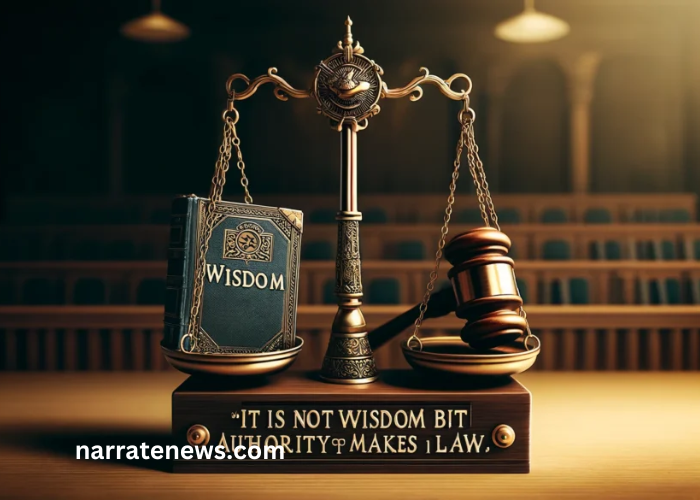
It Is Not Wisdom but Authority That Makes a Law. t – tymoff
The statement “It is not wisdom but authority that makes a law” by Tymoff offers a thought-provoking perspective on the nature of legal systems and governance. It implies that the legitimacy and enforcement of laws are derived from the power and position of those who create them, rather than from an inherent wisdom or moral correctness. This notion raises significant questions about the foundations of law, the role of authority in society, and the implications for justice and governance. In this article, we will explore these themes in depth, examining historical and contemporary examples to understand the relationship between authority, wisdom, and law.
Understanding the Concept of it is not wisdom but authority that makes a law. t – tymoff
Laws are the rules and regulations that govern behavior within a society, designed to maintain order, protect rights, and ensure justice. They are created by legislative bodies, interpreted by the judiciary, and enforced by the executive branch. The effectiveness and fairness of these laws depend largely on the authority behind them.
Authority and Legitimacy: Authority refers to the recognized power or right of an entity or individual to enforce rules and make decisions. In a legal context, this authority is often derived from constitutions, statutes, and precedents. The legitimacy of this authority is crucial for the acceptance and adherence to laws by the populace. Without recognized authority, laws would lack the necessary enforcement mechanisms and societal acceptance to function effectively.
Wisdom and Justice: Wisdom, on the other hand, implies knowledge, experience, and good judgment. In the context of law, wisdom involves creating laws that are just, fair, and promote the well-being of society. Ideally, laws should be based on ethical principles, empirical evidence, and a deep understanding of human behavior and societal needs.
Historical Perspectives on Law and Authority
Throughout history, the balance between authority and wisdom in the creation of laws has been a central theme in political philosophy and legal theory.
Ancient Greece and Rome: In ancient Greece, philosophers like Plato and Aristotle debated the nature of justice and the role of law. Plato’s “Republic” suggests that laws should be crafted by philosopher-kings, individuals who possess both authority and wisdom. Aristotle, in his “Politics,” argued for a mixed government where laws are made by those who possess practical wisdom (phronesis).
In ancient Rome, laws were codified in the Twelve Tables and later in Justinian’s Code. These laws were primarily driven by authority, as Roman emperors and the Senate held the power to enact them. However, the principles of Roman law, such as the presumption of innocence and the right to a fair trial, reflect a degree of wisdom that has influenced modern legal systems.
Medieval Europe: During the medieval period, the authority of laws was often derived from divine right and the power of monarchs. The Magna Carta of 1215 was a pivotal document that began to limit the authority of the king and laid the groundwork for the rule of law, emphasizing that even rulers are subject to the law. This marked a shift towards recognizing that authority alone is insufficient without some degree of wisdom and justice.
Enlightenment and Modern Era: The Enlightenment brought about a significant shift in thinking about law and authority. Philosophers like John Locke and Montesquieu argued for the separation of powers and the protection of individual rights. The United States Constitution and the French Declaration of the Rights of Man and of the Citizen reflect these ideas, establishing laws based on the authority of elected representatives but grounded in principles of justice and human rights.
Contemporary Legal Systems
In modern democratic societies, the creation of laws involves a complex interplay between authority and wisdom. Elected representatives, who derive their authority from the consent of the governed, create laws that are meant to reflect the will and best interests of the people. However, the effectiveness and fairness of these laws depend on the processes and principles underlying their creation.
Legislative Process: In democratic systems, laws are typically created through a legislative process that involves debate, negotiation, and compromise. This process aims to incorporate diverse perspectives and expertise, ideally leading to laws that are both authoritative and wise. However, political dynamics, lobbying, and partisanship can sometimes result in laws that prioritize authority and power over wisdom and justice.
Judicial Review: The judiciary plays a critical role in interpreting laws and ensuring they align with constitutional principles and fundamental rights. Judicial review acts as a check on legislative and executive authority, promoting the wisdom and fairness of laws. Courts can strike down laws that are deemed unconstitutional or unjust, reinforcing the idea that authority alone is insufficient.
International Law: On a global scale, international law is created through treaties, conventions, and agreements between sovereign states. While these laws are based on the authority of the participating states, they also reflect collective wisdom aimed at addressing global issues such as human rights, environmental protection, and conflict resolution. Organizations like the United Nations and the International Court of Justice play key roles in promoting the wisdom and legitimacy of international laws.
Challenges and Criticisms
Despite the mechanisms in place to balance authority and wisdom in lawmaking, there are significant challenges and criticisms.
Authoritarian Regimes: In authoritarian regimes, laws are often created and enforced solely based on the authority of the ruling party or leader, with little regard for wisdom, justice, or the will of the people. Such laws can be oppressive, arbitrary, and violate fundamental human rights. The lack of checks and balances in these systems highlights the dangers of authority untempered by wisdom.
Democratic Erosion: Even in democratic societies, there are concerns about the erosion of democratic principles and the rise of populism. Laws driven by short-term political gains, special interest groups, or majority rule without regard for minority rights can undermine the wisdom and fairness of the legal system. Ensuring that laws reflect long-term societal well-being and justice requires vigilance and active civic engagement.
Technological and Social Change: Rapid technological advancements and social changes pose challenges for legal systems. Laws may struggle to keep pace with innovations in areas such as artificial intelligence, biotechnology, and digital privacy. Crafting wise and effective laws in these contexts requires interdisciplinary expertise and forward-thinking approaches.
The Path Forward
Balancing authority and wisdom in the creation and enforcement of laws is an ongoing challenge that requires continual effort and adaptation.
Education and Civic Engagement: Educating citizens about their rights, the legal system, and the importance of civic participation is crucial for fostering a society where laws reflect both authority and wisdom. Informed and engaged citizens can hold their representatives accountable and advocate for just and fair laws.
Ethical Leadership: Leaders and lawmakers must prioritize ethical considerations and long-term societal well-being in their decision-making processes. This involves listening to diverse perspectives, relying on expert advice, and being transparent and accountable in their actions.
Interdisciplinary Collaboration: Addressing complex and evolving issues requires collaboration across disciplines. Legal experts, scientists, technologists, ethicists, and social scientists must work together to create laws that are informed by comprehensive knowledge and understanding.
Global Cooperation: In an increasingly interconnected world, global challenges such as climate change, pandemics, and international conflicts require coordinated legal responses. Strengthening international legal frameworks and cooperation can enhance the wisdom and effectiveness of laws addressing these issues.
Conclusion
The statement “It is not wisdom but authority that makes a law” by Tymoff underscores the critical role of authority in the creation and enforcement of laws. However, authority alone is insufficient for ensuring that laws are just, fair, and effective. A legal system that balances authority with wisdom, ethical principles, and a commitment to justice is essential for the well-being and stability of society. By learning from history, embracing democratic principles, and adapting to contemporary challenges, we can strive to create laws that truly serve the common good.


